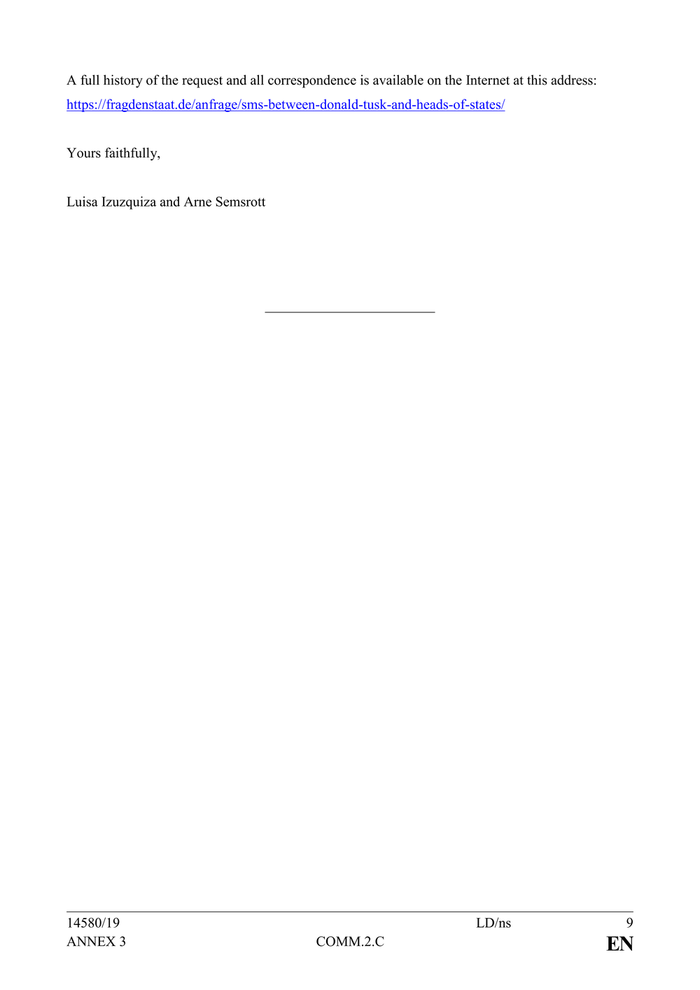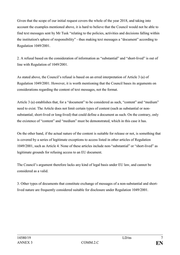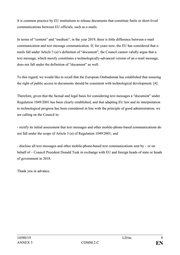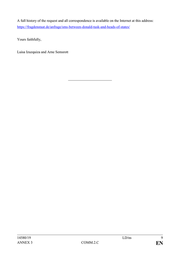st-14580-2019-init
Dieses Dokument ist Teil der Anfrage „Working Party on Information documents 2019 and 2020“
Council of the European Union Brussels, 28 November 2019 (OR. en) 14580/19 INF 322 API 167 NOTE From: General Secretariat of the Council To: Working Party on Information Subject: Public access to documents - Confirmatory application No 39/c/01/19 Delegations will find attached the: • request to the European Council for access to documents sent to the General Secretariat of the Council on 5 November 2019 and registered the same day (Annex 1); • reply from the General Secretariat of the Council dated 25 November 2019 (Annex 2); • confirmatory application dated 25 November 2019 and registered on 26 November 2019 (Annex 3). 14580/19 LD/ns 1 COMM.2.C EN

ANNEX 1 [E-mail message sent to access@consilium.europa.eu on 5 November 2019 - 9:20] From: Arne Semsrott [#169833] <a.semsrott.pr2vzmxg8n@fragdenstaat.de> Sent: Tuesday, November 5, 2019 9:20 AM To: TRANSPARENCY Access to documents (COMM) <Access@consilium.europa.eu> Subject: SMS between Donald Tusk and heads of states [#169833] Dear European Council, Under the right of access to documents in the EU treaties, as developed in Regulation 1049/2001, we are requesting documents which contain the following information: All text messages (i.e., SMS messages) and other mobile-phone-based text communications (e.g., WhatsApp, Telegram, iMessage, Facebook Chat, SnapChat, Slack, Facebook and Twitter "direct messages," Signal Messenger, Wire, etc.) sent by – or on behalf of – Council President Donald Tusk in exchange with EU and foreign heads of state or heads of government in 2018 Yours faithfully, Luisa Izuzquiza and Arne Semsrott a.semsrott.pr2vzmxg8n@fragdenstaat.de Postanschrift Arne Semsrott c/o Open Knowledge Foundation Deutschland e.V., Singerstraße 109, 10179 Berlin -- Rechtshinweis: Diese E-Mail wurde über den Webservice fragdenstaat.de versendet. Antworten werden ggf. im Auftrag der Antragstellenden auf dem Internet-Portal veröffentlicht. Falls Sie Fragen dazu haben oder eine Idee, was für eine Anfrage bei Ihnen im Haus notwendig wäre, besuchen Sie: https://fragdenstaat.de/hilfe/fuer-behoerden/ 14580/19 LD/ns 2 ANNEX 1 COMM.2.C EN

ANNEX 2 Council of the European Union General Secretariat Directorate-General Communication and Information - COMM Directorate Information and Outreach Information Services Unit / Transparency Head of Unit Brussels, 25 November 2019 Mr Arne Semsrott Email: a.semsrott.pr2vzmxg8n@fragdenstaat.de Ref. 19/2305-ld/mf Request made on: 05.11.2019 Dear Mr Semsrott, Thank you for your request for access to "All text messages (i.e., SMS messages) and other mobile- phone-based text communications (e.g., WhatsApp, Telegram, iMessage, Facebook Chat, SnapChat, Slack, Facebook and Twitter "direct messages," Signal Messenger, Wire, etc.) sent by – or on behalf of – Council President Donald Tusk in exchange with EU and foreign heads of state or heads of government in 2018" . 1 1 The General Secretariat of the Council - acting as secretariat for the European Council pursuant to Article 235(4) of the Treaty on the Functioning of the European Union - has examined your request on the basis of the applicable rules: Regulation (EC) No 1049/2001 of the European Parliament and of the Council regarding public access to European Parliament, Council and Commission documents (OJ L 145, 31.5.2001, p. 43) and the specific provisions of the European Council's Rules of Procedure (European Council Decision No 2009/882/EU, OJ L 315, 2.12.2009, p. 51) set out in Article 10(2) which makes Annex II to the Council's Rules of Procedure (Council Decision No 2009/937/EU, OJ L 325, 11.12.2009, p. 35) applicable mutatis mutandis. 14580/19 LD/ns 3 ANNEX 1 COMM.2.C EN

I regret to inform you that no such SMS messages or other mobile-phone-based text communications sent out in the professional context containing substantial and not short-lived information that would be considered as documents drawn up by the European Council within the meaning of Article 3(a) of Regulation (EC) No 1049/2001 are in the possession of the GSC. Yours sincerely, Fernando FLORINDO 14580/19 LD/ns 4 ANNEX 1 COMM.2.C EN

ANNEX 3 [E-mail message sent to access@consilium.europa.eu on 25 November 2019 - 8:50] From: Arne Semsrott [#169833] <a.semsrott.pr2vzmxg8n@fragdenstaat.de> Sent: Monday, November 25, 2019 8:50 PM To: TRANSPARENCY Access to documents (COMM) <Access@consilium.europa.eu> Subject: Confirmatory application Ref. 19/2305-ld/mf [#169833] Dear Council of the EU, please note that the original request was filed both by Luisa Izuzquia and Arne Semsrott. Please pass this on to the person who reviews confirmatory applications. We are filing the following confirmatory application with regards to our access to documents request 'SMS of Donald Tusk and heads of state'. On 5 November 2019, we submitted an access to documents request for: “All text messages (i.e., SMS messages) and other mobile-phone-based text communications (e.g., WhatsApp, Telegram, iMessage, Facebook Chat, SnapChat, Slack, Facebook and Twitter "direct messages," Signal Messenger, Wire, etc.) sent by – or on behalf of – Council President Donald Tusk in exchange with EU and foreign heads of state or heads of government in 2018” The request was registered by the Council on 5 November 2019 under reference 19/2305-ld/mf. On 26 November 2019, the Council refused access to the request arguing that: “no such SMS messages or other mobile-phone-based text communications sent out in the professional context containing substantial and not short-lived information that would be considered as documents drawn up by the European Council within the meaning of Article 3(a) of Regulation (EC) No 1049/2001 are in the possession of the GSC.” 14580/19 LD/ns 5 ANNEX 3 COMM.2.C EN

To this regard, we would like to argue that: 1. Text messages and other mobile-phone based text communications do fall under the definition of “document” in Regulation 1049/2001. Article 3 (a) of Regulation 1049/2001 reads: “‘document’ shall mean any content whatever its medium (written on paper or stored in electronic form or as a sound, visual or audiovisual recording) concerning a matter relating to the policies, activities and decisions falling within the institution's sphere of responsibility;” To this extent, the Council cannot validly argue that a text message does not constitute “content” transmitted via an electronic “medium”. It is also undeniable that all correspondence - including text messages and other mobile-phone-based communications - exchanged between Council President Donald Tusk and EU heads of state and government fall, at the very least, into “a matter relating to” “activities” within the Council’s responsibility, if not “policies” and/or “decisions”. It is in fact public knowledge that mobile-phone-based communications take place between politicians - and among European leaders in particular -, and that when these communications happen, they will frequently relate to a policy matter or to an activity or decision that affects the public interest. Example of this kind of practice can be found in news reports. A recent story by Yahoo! Finance describes a Commission spokesperson stating that EC President Juncker and UK Prime Minister May are in touch via text message. [1] A recent Guardian story notes that diplomats outside of the room are informed about progress at Council meeting by text message [2]. Also, President Tusk has reportedly done important negotiations via text. According to a story by the Associated Press, Greek debt crisis negotiations in July 2015 were saved by SMS between President Tusk and Dutch Premier Mark Rutte. 14580/19 LD/ns 6 ANNEX 3 COMM.2.C EN

Given that the scope of our initial request covers the whole of the year 2018, and taking into account the examples mentioned above, it is hard to believe that the Council would not be able to find text messages sent by Mr Tusk “relating to the policies, activities and decisions falling within the institution's sphere of responsibility” - thus making text messages a “document” according to Regulation 1049/2001. 2. A refusal based on the consideration of information as “substantial” and “short-lived” is out of line with Regulation of 1049/2001. As stated above, the Council’s refusal is based on an erred interpretation of Article 3 (a) of Regulation 1049/2001. However, it is worth mentioning that the Council bases its arguments on considerations regarding the content of text messages, not the format. Article 3 (a) establishes that, for a “document” to be considered as such, “content” and “medium” need to exist. The Article does not limit certain types of content (such as substantial or non- substantial; short-lived or long-lived) that could define a document as such. On the contrary, only the existence of “content” and “medium” must be demonstrated, which in this case it has. On the other hand, if the actual nature of the content is suitable for release or not, is something that is covered by a series of legitimate exceptions to access listed in other articles of Regulation 1049/2001, such as Article 4. None of these articles include non-“substantial” or “short-lived” as legitimate grounds for refusing access to an EU document. The Council’s argument therefore lacks any kind of legal basis under EU law, and cannot be considered as a valid. 3. Other types of documents that constitute exchange of messages of a non-substantial and short- lived nature are frequently considered suitable for disclosure under Regulation 1049/2001. 14580/19 LD/ns 7 ANNEX 3 COMM.2.C EN

It is common practice by EU institutions to release documents that constitute futile or short-lived communications between EU officials, such as e-mails. In terms of “content” and “medium”, in the year 2019, there is little difference between e-mail communication and text message communication. If, for years now, the EU has considered that e- mails fall under Article 3 (a)’s definition of “document”, the Council cannot validly argue that a text message, which merely constitutes a technologically-advanced version of an e-mail message, does not fall under the definition of “document” as well. To this regard, we would like to recall that the European Ombudsman has established that ensuring the right of public access to documents should be consistent with technological development. [4] Therefore, given that the factual and legal basis for considering text messages a “document” under Regulation 1049/2001 has been clearly established, and that adapting EU law and its interpretation to technological progress has been considered in line with the principle of good administration, we are calling on the Council to: - rectify its initial assessment that text messages and other mobile-phone-based communications do not fall under the scope of Article 3 (a) of Regulation 1049/2001; and - disclose all text messages and other mobile-phone-based text communications sent by – or on behalf of – Council President Donald Tusk in exchange with EU and foreign heads of state or heads of government in 2018. Thank you in advance. 14580/19 LD/ns 8 ANNEX 3 COMM.2.C EN
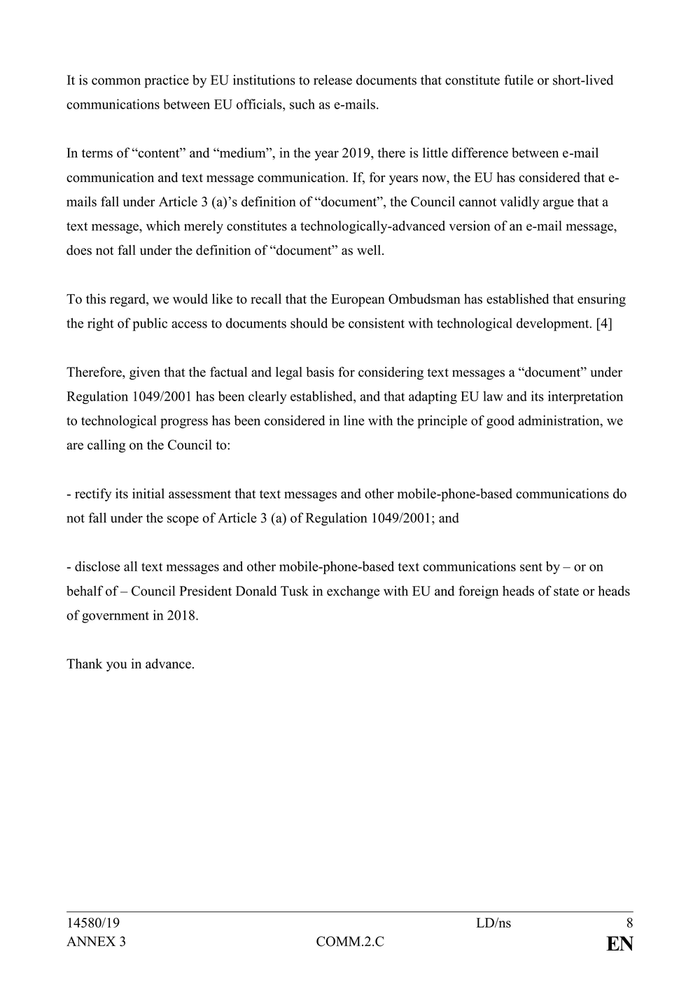
A full history of the request and all correspondence is available on the Internet at this address: https://fragdenstaat.de/anfrage/sms-between-donald-tusk-and-heads-of-states/ Yours faithfully, Luisa Izuzquiza and Arne Semsrott 14580/19 LD/ns 9 ANNEX 3 COMM.2.C EN
